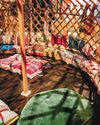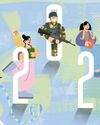
Scan your face to unlock your phone or clear immigration checks. Scan your finger to unlock the door. Now, palm reading is also coming to the fore as tech firms get creative with using biometrics.
At Alchemist cafe at 71 Robinson Road, a select group of Visa employees have been swiping their hands for several weeks now to pay for coffee, under a trial with Chinese tech giant Tencent to test its Palm Scan Payments system in Singapore.
Plans are afoot to expand the trial to other DBS Bank, OCBC Bank and UOB Visa card holders in Singapore, Tencent's first international stop outside China after having outfitted Beijing's airport express train service and more than 1,500 7-Eleven convenience stores in Guangdong province with its palm-reading technology.
Imagine the convenience of leaving home with just you. No cards. No phones, which often run out of juice.
The argument for increasing use of people's biometric data in everyday scenarios - in shops, at entertainment venues and on public transport - is convenience and security. However, it is one thing for governments to collect your face, finger and gait data for security, and another when firms with commercial interests get in the game.
What happens if your biometric data is stolen, or falls into the wrong hands? What is the price of paying with your palm?
WHAT DATA IS HARVESTED?
Let's unpack the technology to better understand what could be at stake.
On Nov 6, when The Straits Times visited the Tencent and Visa booths at the Singapore Fintech Festival, the companies demonstrated that a one-time enrolment to capture one's palm data is required.
This is done in a few seconds using Tencent's payment reader, which sports two cameras (one for reading the lines on the palm and another for detecting the veins under the skin).
Diese Geschichte stammt aus der November 08, 2024-Ausgabe von The Straits Times.
Starten Sie Ihre 7-tägige kostenlose Testversion von Magzter GOLD, um auf Tausende kuratierte Premium-Storys sowie über 8.000 Zeitschriften und Zeitungen zuzugreifen.
Bereits Abonnent ? Anmelden
Diese Geschichte stammt aus der November 08, 2024-Ausgabe von The Straits Times.
Starten Sie Ihre 7-tägige kostenlose Testversion von Magzter GOLD, um auf Tausende kuratierte Premium-Storys sowie über 8.000 Zeitschriften und Zeitungen zuzugreifen.
Bereits Abonnent? Anmelden

British novelist David Lodge was twice shortlisted for Booker Prize
British novelist David Lodge, who was shortlisted for the Booker Prize twice, has died at the age of 89, his publisher said on Jan 3.

A CITY FOR BABIES
After a successful experiment, The City of Babies Lab has opened a new permanent space dedicated to children aged from birth to 23 months.

Scientist Names 16 New Spider Species After Jay Chou's Songs
A Chinese scientist has named 16 new spider species after songs by popular Mandopop musician Jay Chou.

Actress JJ Jia Xiaochen upset with hubby for not remembering wedding anniversary
Chinese actress JJ Jia Xiaochen has grumbled about her husband, Hong Kong action star Louis Fan, on social media again.

Actress Chen Liping leaves Mediacorp after 40 years
Actress Chen Liping, a household name in the local entertainment industry, has left broadcaster Mediacorp after 40 years.

Raising four cats costly, but gives Rui En four times the joy
In this new series, The Straits Times speaks to pet-owning personalities about the trials and delights of raising their fur kids

Vet Talk Check that your pet is eating safely during the festive season
Pet ownership is on the rise in Singapore, with many families treating their furry companions as one of their own.

Learning to embrace change positively
On the last evening of our recent family holiday, my three children were having a boisterous conversation in the bedroom of the apartment we were staying in.

STRONGER, TOGETHER
Good parent-teacher relationships can boost a child's confidence and holistic development

Roaring Off To A-League Adventure
Tan makes Brisbane debut as sub in loss to Canberra on her return from knee surgery